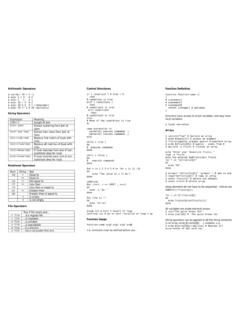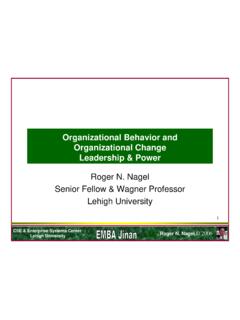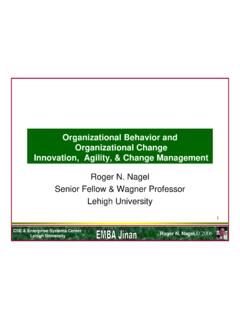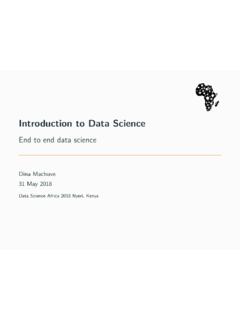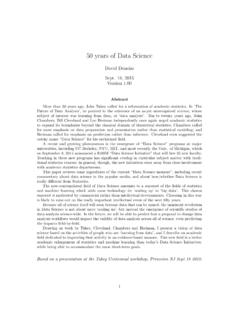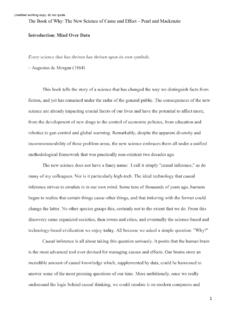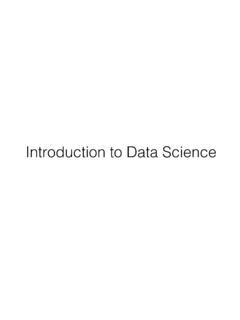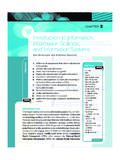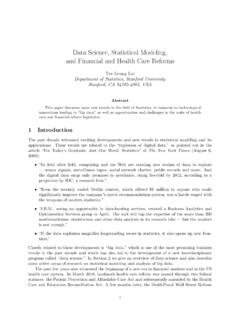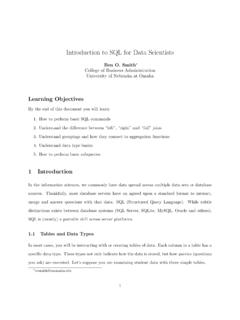Transcription of CSE 160: Introduction to Data Science
1 cse 160 : Introduction to data Science Fall 2018 10:10am-11:00am MWF RB 184* *We will meet in Packard 101 on Sep 21, Oct 12, and Nov 30. Catalog Description data Science is an interdisciplinary field focusing on the computational analysis of data to extract knowledge and insight. This course introduces the student to the collection, preparation, analysis, modeling and visualization of data , covering both conceptual and practical issues. Examples from diverse fields will be presented, and hands-on use of statistical and data manipulation software will be included. Student Learning Outcomes After taking Introduction to data Science , you will: i. Recognize the various disciplines that contribute to a successful data Science effort.
2 Ii. Understand the processes of data Science : identifying the problem to be solved, data collection, preparation, modeling, evaluation and visualization. iii. Be aware of validity challenges as well as ethical issues that arise in data Science tasks. iv. Develop an appreciation of the many techniques for data modeling and mining. v. Be comfortable using computational tools such as the R language and its associated libraries for data analytics and visualization. Prerequisites CSE 2, 12 or BIS 335 or other programming experience (with permission of instructor) Contact Information Prof. Brian D. Davison ~brian/ E-mail: or Office Hours: Mon 11:10-noon and Thu 10:45-11:45am in PA 118 (or by appointment) Teaching Assistant: Qinghan Xue (qix213) Office Hours: Mon 3-5pm, Packard 6th Floor Graders: Zach Vinik (zjv220) and Samuel Chebruch (sac320).
3 For fastest response, use the Piazza site to post your questions. You should get an answer quickly from the instructor, a grader, or a fellow student. But (of course) contact us directly by email or in person regarding items of a personal matter. Online Resources Homework, Projects, Grades: Announcements, Discussions, Notes: The Piazza plug-in within CourseSite. Textbooks (required) data Science for Business. By F. Provost and T. Fawcett. O Reilly, 2013. ISBN 978-1-449-36132-7. An Introduction to data Science . By J. Saltz and J. Stanton. Sage, 2018. ISBN 978-1-5063-7753-7. Topics expected to be covered Introduction to the field of data Science ; data collection; experimental design; data attributes; data cleaning; data characterization and analysis; data modeling and mining techniques; model evaluation; visualization; applications of data Science ; R scripting.
4 Along the way we will also discuss aspects of privacy, security and social impacts. The course will also include a number of guest lecturers throughout the semester to introduce students to the variety of applications of data Science . Academic Honesty Unless specifically permitted otherwise, the work you submit must be entirely your own. While we encourage you to discuss basic concepts and strategies with friends and classmates, the copying or sharing of solutions, in whole or in part, is never acceptable. Both the person receiving the copied work and the person providing the copied work are equally responsible. Such cases will be referred to the University Committee on Discipline and, if found guilty, you may be given a failing grade in the course (or worse).
5 If you have questions about this policy at any point throughout the semester, ask. It is far better to be safe than sorry when your academic career may be on the line. Attendance Attendance is required for all class meetings and guest presentations. Since most of the material is cumulative, a missed class will put you behind in a short time. Grading Grades will be a function of homework and quizzes (collectively worth 30%), class participation (10%) and exams. There may be one or two guest talks outside of class. Pop quizzes may occur at any time. You are responsible for everything that occurs in class as well as assigned readings. Late assignments will be penalized 10% per day, up to three days late; after that, no credit is possible.
6 There will be two in-class exams (20% each) and a final group project (20%). Exam dates are announced at the beginning of the semester. Missed exams without a legitimate excuse will result in a score of 0 on that exam. Final letter grades are assigned at the discretion of the instructor ( , not always using a fixed metric). Accommodations for Students with Disabilities If you have a disability for which you are or may be requesting accommodations, please contact both your instructor and the Office of Academic Support Services, Williams Hall, Suite 301 (610-758-4152) as early as possible in the semester. You must have documentation from the Academic Support Services office before accommodations can be granted.
7 Principles of Equitable Community Lehigh University endorses The Principles of our Equitable Community. We expect each member of this class to acknowledge and practice these Principles. Respect for each other and for differing viewpoints is a vital component of the learning environment inside and outside the classroom. Last revised: 25 August 2018

